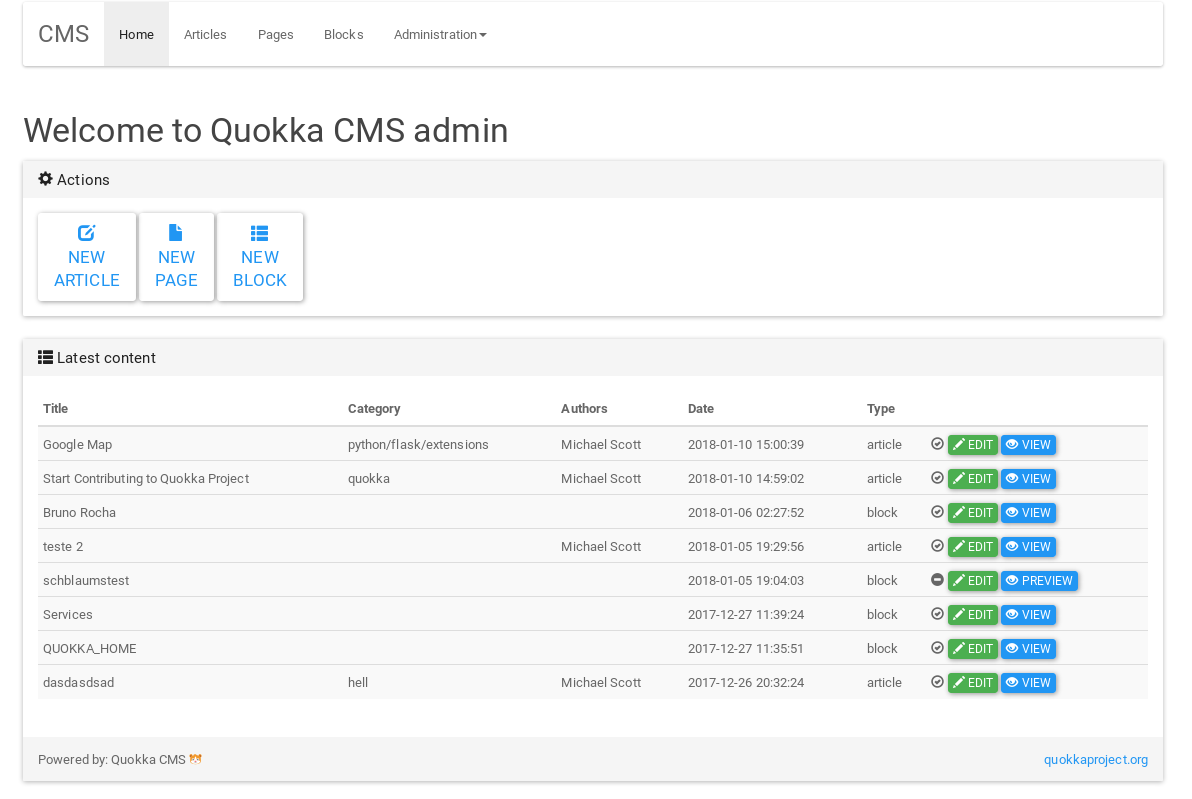Quokka is a Content Management Framework written in Python.
A lightweight framework to build CMS (Content Management System) as websites, portals, blogs, applications and anything related to publishing content to the web.
Quokka is not limited to CMS area, it is also possible to create Quokka extensions to provide any kind of web application based on Python and Flask.
Quokka can also (optionally) generate a static website from the contents generated in its admin interface.
- Web based content management admin interface
- Multiple content formats (markdown, rst, html, plaintext)
- Compatibility with any of the Pelican Themes
- Flat file NoSQL database TinyDB or optionally MongoDB for scale deployments
- Host the Quokka on server or generate a static website
- Extensible via modules/plugins
- Powered by Python, Flask, Flask-Admin, TinyMongo and Pelican Themes
NOTE: QuokkaCMS requires Python 3.6+
this is the recommended way while 1.0.0 is not released
git clone https://github.com/rochacbruno/quokka
cd quokka
python3 -m venv venv
. venv/bin/activate
make install
make adduser
make devserverthen access http://localhost:5000 and http://localhost:5000/admin
edit the quokka/project_template/quokka.yml and start hacking the code!
May not be stable until 1.0.0 is released
python3 -m venv venv
. venv/bin/activate
pip3 install quokka$ quokka init NewWebsite --theme=flex --modules=gitpages,heroku
...🐹 Quokka project created 🐹
📝 Name: NewWebsite
📁 Location: /tmp/newwebsite
📚 Template: default
🎨 Themes: flex theme installed
🚚 Modules: [gitpages, heroku] installed
🔧 Config: Config file written in /tmp/newwebsite/quokka.yml
➡ Go to /tmp/newwebsite
⚙ run `quokka runserver` to start!
📄 Check the documentation on http://quokkaproject.org
🐹 Happy Quokka! 🐹YES! it outputs emojis 🐹
The above command will generate your project in myproject folder as:
.
├── databases # TinyDB database files (gitignored)
├── modules # Custom modules to load on EXTRA_EXTENSIONS
├── static_build # output static site
├── themes # Front-end Themes (Pelican and Quokka Themes supported)
├── uploads # Media uploaded via admin
├── .gitignore # gitignore to exclude sensitive files
├── quokka.yml # Project settings
├── .secrets.yml # To store keys, tokens and passwords (gitignored)
└── wsgi.py # To deploy `gunicorn wsgi:app`You can optionally pass arguments:
Choose existing theme (the default is Malt)
quokka init mywebsite --theme http://github.com/user/themeInstall modules
quokka init mywebsite --theme http://github.com/user/theme --modules="commerce,foo"the above looks for
quokka_commerceandquokka_fooin PyPI and installs it
quokka init mywebsite --theme http://github.com/user/theme --config="auth_enabled=false"That is optional, you can to edit
quokka.ymlto tune your settings.
quokka adduser
quokka runserver --port 5000Check the wsgi.py and refer to it when deploying in wsgi servers.
cd myproject
gunicorn wsgi:app -w 4 -b "0.0.0.0:8000"An example of supervisord config
[program:quokka]
command=/myproject/venv/bin/gunicorn wsgi:app -w 4 -b "0.0.0.0:8000"
directory=/myprojectFor more information read Gunicorn documentation
NOTE: To generate a static website all user management, keys and passwords will be removed from settings.
Once you have your website running locally you can easily generate a static HTML website from it.
$ quokka publish --static [--output path]
Generating static HTML website on ./static_build folderOnce you have a ./static_build folder populated with static website you can deploy it using SCP, FTP or git, it is a full static website.
NOTE: You need either ssh key access to github or it will ask login/password
quokka publish --static --git=rochacbruno/mysite --branch=gh_pagesThe above is also available in admin under 'publish' menu.
quokka publish --static --scp --dest='me@hostname:/var/www/mysite' [--sshkey ~/.ssh/key] [--password xyz]
password : ...This requires
herokuclient installed, ifProcfileis not found it will be generated
quokka publish --static --heroku --optionsquokka publish --static --ftp --host='ftp://server.com' --dest='/var/www/mysite'When you publish a static website along with the static files the database also goes to the server under the databases/ folder only as a backup and snapshot.
You can load that remote database locally e.g: to add new posts and then re-publish
quokka restoredb --remote --git=rochacbruno/mysite
Creating a backup of local database...
Downloading remote database
Restoring database..
Done...Now you can run quokka runserver open your localhost:5000/admin write new content
and then Publish website again using command line or admin interface.
NOTE: If you want to restore a local database use
--localand--path path/to/db
You can choose to use MongoDB instead of TinyDB, That is useful specially if you deploy or local instance has more than one admin user concurrently and also useful if you want to install plugins which support MongoDB only (because it relies on aggregations and gridfs)
You only need a running instance
of Mongo server and change quokka.yml:DB on your project from:
quokka:
DB:
system: tinydb
folder: databasesto:
quokka:
DB:
system: mongodb
name: my_database
host: 127.0.0.1
port: 2600Then when running quokka again it will try to connect to that Mongo Server.
With that you can deploy your site on wsgi server or can also generate static website.
cd your_quokka_project_folder
docker run -d -v $PWD/databases:/data/db -p 27017:27017 mongo
# wait some seconds until mongo is started
quokka runserverDo you want to be part of this open-source project?
Take a look at Contributing Guidelines
Ensure you have Python3.6+ fork this repo and:
git clone https://github.com/$YOURNAME/quokka
cd quokka
# create a Python3.6 virtual env
make create_env
# activate the venv
. venv/bin/activate
# install Quokka in --editable mode (using pbr)
make install
# Create a new admin user
make adduser
# run quokka
make devserverAccess http://localhost:5000/admin and http://localhost
This list is available on https://github.com/rochacbruno/quokka/issues
This is the list of tasks to be completed until 1.0.0 can be released.
support 100% coming only for malt and bootstrap3 themes
An article showing in Malt theme
The same article using Bootstrap 3 theme
See more on screenshots on quokkaproject#647




